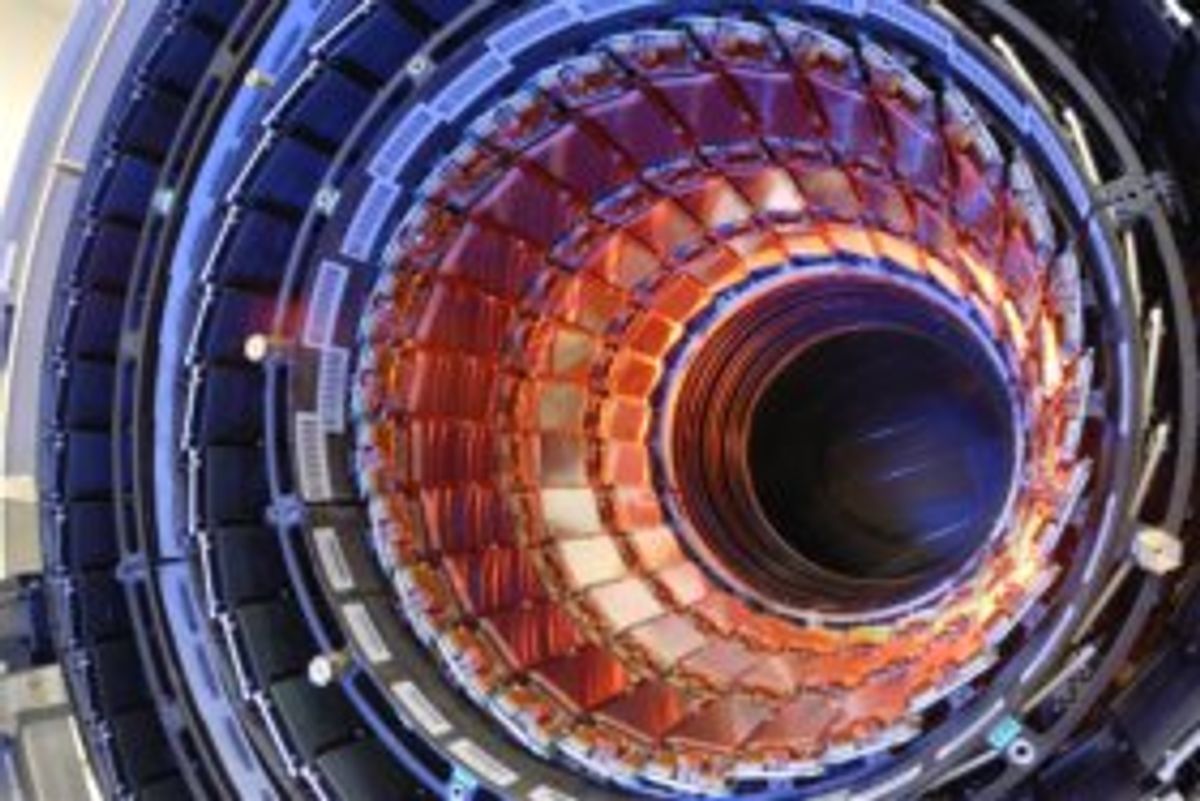Such an invitation would certainly suggest LHC physicists are expecting to make a big announcement. But according to at least one person well acquainted with those theorists, they weren't so much formally invited as welcomed to attend.
Either way, the breathless headline and the searching nature of the news gives you an idea of just how much Higgsmania has grown over the last few weeks and how little information the general public has had to go on. And in the absence of any hard data, speculation abounds. While some LHC physicists are making a valiant effort to manage expectations, the blogosphere is filled with rumors suggesting we're in for some big news.
Here's where things stand now: In December, the LHC’s two Higgs-hunting experiments announced results indicating tentative hints of what might be the Higgs boson—the last undiscovered particle in the Standard Model of particle physics—in data from the collider's proton collisions. Excitingly, both experiments pinpointed a Higgs in the same mass range, but with very little certainty. The results fell on either side of 3 sigma, corresponding to roughly 1 in 1000 odds that a signal might just be random noise. In the world of sports betting, that's a dead certainty, but in the realm of high-energy physics, it's far short of what’s needed to declare a definitive discovery. For that, particle physicists demand a certainty of five sigma, corresponding to a less than one in a million chance that the signal might turn up by chance.
So, in April this year, the LHC returned from a winter break and began colliding more protons at higher energy than ever before. In mid-June, the collider ended this run, and since then, the physicists working on the experiments have been scrambling to analyze the data in time for the International Conference on High Energy Physics (ICHEP), which starts this week, around the same time as CERN's "curtain-raising" seminar.
So is there enough data to hit the magic number, if the signal's in fact still there? According to blogger Peter Woit, the answer is yes. "Reports from the experiments indicate that at least one of them, if not both, will reach the 5 sigma level of significance for the Higgs signal," he wrote on 22 June. "So, this will definitely be the long-awaited Higgs discovery announcement, and party-time for HEP [high-energy physics] physicists."
But not so fast, says CERN. "There are three things that can happen," says James Gillies, CERN's director of communications told the BBC. The Higgs signal has "gone down in significance, it has gone up in significance - but not to the point where physicists can claim a discovery - or thirdly, that there's a discovery." The BBC also quotes a member of the ATLAS experiment who says that "one shouldn't get too excited" and that "strange things can happen with low statistics." He notes that this is just one snapshot of the data that will come this year and that there will be two more—one in September and another toward the end of the year.
And if that hasn't dashed your hopes for a definitive answer this week, read this post by physicist Matt Strassler. If the hint does not hold up, Strassler says, that still doesn't spell the end for the Higgs. And if the signal does strengthen to the level of a definitive discovery, he adds, "the correct understanding of that particle...may take many years."
Of course, it's hard not to get excited, especially when physicists might just be closing in on a quarry that has eluded them for decades. Fermilab added to the frenzy today by announcing that its own evidence for the Higgs has gotten stronger. Combined analysis of two experiments that operated at the Tevatron collider, which shut down in September 2011, pegs the Higgs at roughly the same mass range as the CERN experiments.
The signal was only seen with a certainty of 2.9 sigma, giving it rather high (1 in 550) odds that the signal could have resulted by chance. But given that it's consistent with the LHC results, I'm looking forward to seeing what Wednesday's seminar will bring. If you’d like to watch along yourself, CERN will webcast the event live at 0900 CEST at https://webcast.cern.ch.
Update: Citing anonymous sources, Nature News reports that both LHC experiments now see stronger hints of some new particle, but that the certainty now falls between 4.5 and 5 sigma, still short of the 5 sigma that particle physicists traditionally like to have before declaring a discovery.
Image: CERN
Rachel Courtland, an unabashed astronomy aficionado, is a former senior associate editor at Spectrum. She now works in the editorial department at Nature. At Spectrum, she wrote about a variety of engineering efforts, including the quest for energy-producing fusion at the National Ignition Facility and the hunt for dark matter using an ultraquiet radio receiver. In 2014, she received a Neal Award for her feature on shrinking transistors and how the semiconductor industry talks about the challenge.




